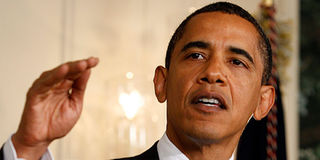Breaking News: CDF Ogolla involved in KDF chopper crash
Africa expected more from Obama than governance talk

U.S. President Barack Obama delivers remarks on health care in the Diplomatic Reception Room of the White House in Washington July 17, 2009. PHOTO/REUTERS
Kenya’s sense of propriety when it comes to Barack Obama was on display from the naked pique in the country’s reaction to Barack Obama’s choice of Ghana as the first sub-Saharan African country to visit. From the media commentaries to the political gallery, one could feel it.
Yet in much of Africa, there was a larger sense of disappointment in the much-anticipated “policy speech” to the continent the US President made before Ghana’s Parliament. It was a sharp contrast with his stellar performance in Cairo on June 4 when he made a momentous address to the Muslim world.
Simplistic line
For somebody of Obama’s background with African ancestry, many Africans expected him to seek to define the continent in fresh and more creative terms – not necessarily laudatory – than what past American administrations have tended to do.
Instead, what he said was more of the same old simplistic line: good governance equals prosperity, corruption pervades Africa, and so on.
In his Cairo address, the US President defined a totally fresh embrace of the Muslim world that would have been unthinkable under the regime of George W. Bush. He also signalled his government’s respect for religious and cultural differences, even expressing a singular admiration for Islam that brought his audience to its feet.
Paradoxically, Obama’s different tune to sub-Saharan Africa is precisely because this place does not constitute the existential threat to US interests America tends to perceive from the Muslim world. If one cancels out puny Somalia, the continent is not the theatre of the much-hyped religious-cultural “clash of civilizations” feared by the West. Nor does it remotely have anything like a rising geo-political rival to America’s power as China is.
The US knows it can outspokenly sustain the mantra of democracy and human rights and good governance without fear that the usual (official) negative African reactions will cause serious trouble to Pax Americana. Not so with the Middle East, where virulent anti-Americanism has forced Obama to try the reconciliatory approach.
Shifting oil dependance
Ever since the end of the Cold War, the US has operated with the certainty that Africa has no choice but to acquiesce to the US’s overall hegemony. With no Soviet Union vying for the continent’s favours, Africa has been left with few, if any, options but to toe the line.
Broadly, US interests in Africa hinge on stability. But the same can be said of the superpower’s interests in Europe, Latin America and Asia – indeed the world over. What marks out Africa is a conscious US policy, from not too long ago, to shift its dependence on Middle East oil to sub-Saharan sources. It is no coincidence that US oil companies like Chevron are now major players in Nigeria and Angola, the top sub-Saharan petroleum producers. And as Obama was visiting, various reports noted that Ghana will from next year start exporting the commodity following the discovery of large deposits there.
Some years back, a purported “CIA analysis” of the possibility of Nigeria’s break-up – which the Nigerian government vehemently rejected and whose authenticity the US was forced to deny – nonetheless raised the sort of scenario that would be a nightmare for the US in Africa. Nigeria is the top African oil exporter to the US and the sixth biggest in terms of worldwide oil exports to America. Aside from threatening the flow of the oil, a failure of the 140-million-population-plus Nigerian state would swarm West Africa and cause a meltdown in the entire region.
What will surely cause the US to reconsider its placid view of Africa as a pristine backwater which should occasionally be barked at is the entry of China into the competition for the continent’s awesome natural resources. From East, West, South and Central Africa, China has been striking deals to secure raw materials in return for generous loans and infrastructure projects, a trend the US has been watching with growing trepidation.
Just months ago, the IMF, backed by Western donors, quarrelled with the government of the Democratic Republic of Congo over a $9 billion mining and infrastructure package the DRC has signed with the Chinese. “No, we will not revisit this contract,” ruled President Joseph Kabila emphatically. “The Congolese government is making sacrifices to benefit from debt relief, but it also needs to renew its infrastructure.” So far, Congo seems to be winning that argument.
Gitau Warigi is a columnist with Sunday Nation


